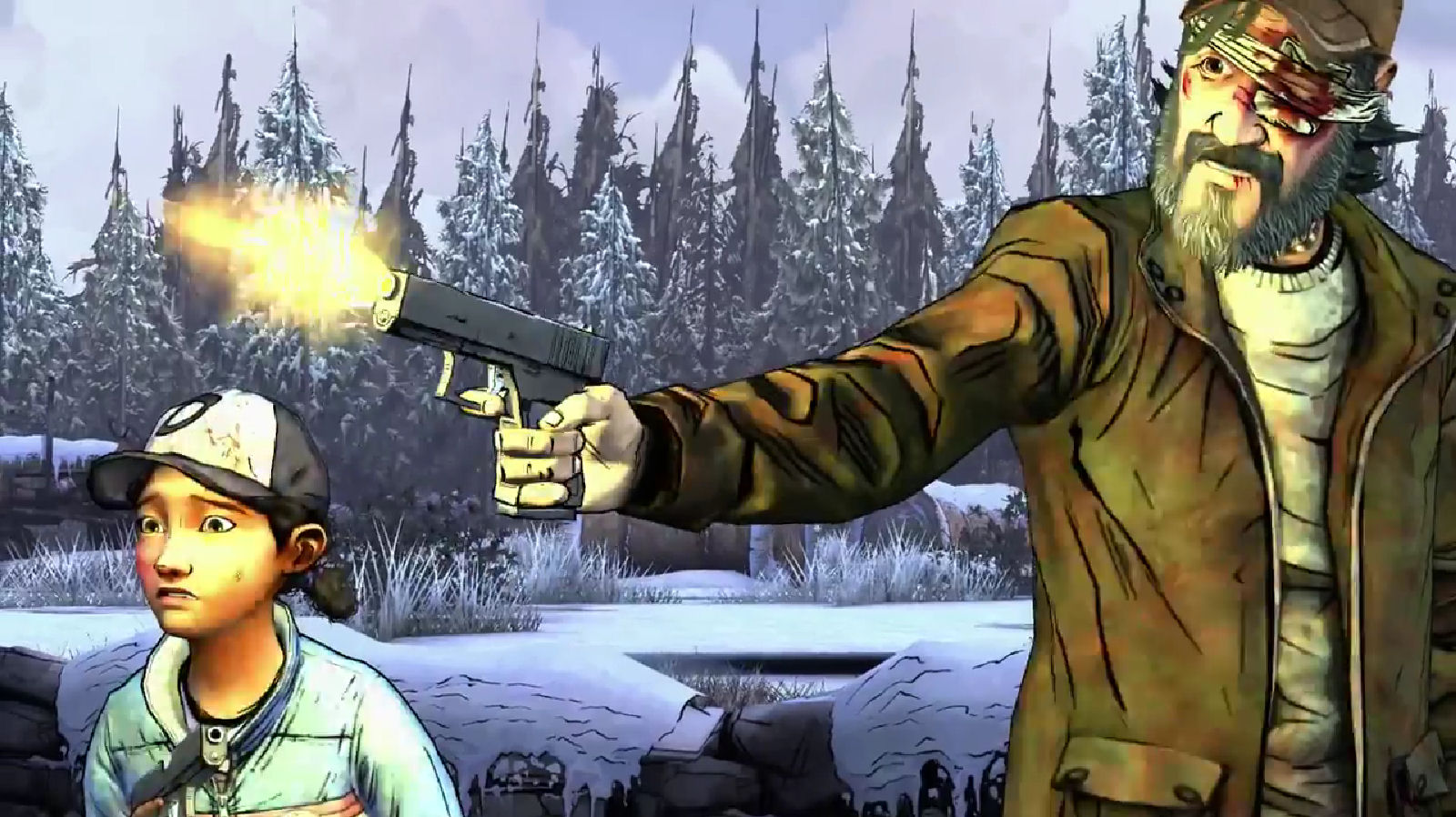Wow… just… wow… Okay… so Walking
Dead Season Two review. Spoilers inbound (you've been warned). Lucky you, getting two reviews in one week.
Season Two is all Clementine’s story… at first. We see her
aftermath at the loss of her adoptive father, Lee. We see her find new people
to try and survive with. Our time with them feels short and impersonal as most
everyone wants to keep us at arm’s length. This makes it really hard for me, at
the very least, to like any of the new characters right away. That being said,
those that survive to the last two chapters do manage to leave an impression on
me that made me glad we were all along for the ride.
This chapter also reunites us with Season One’s Kenny. Love
him or hate him, Kenny was a polarizing figure who, once again, will end up
being a good ally or come off as a dangerous psychopath to you this season. In
my season-one run with Kenny, he was a close friend who had my back as much as
I had his. I figured I’d keep that trend going because it didn’t fail me
before. Much like then, in MOST cases, I was not disappointed by the
camaraderie between Kenny and Clem and how their combined teamwork and trust
was capable of accomplishing seemingly daunting tasks.
 That being said, once Kenny is introduced, the story becomes
just as much his as it is Clem’s. The loss of his old family, tons of physical
punishment, the loss of his new family, and the struggle to maintain his mental
acuity when everyone else was doubting him (given the evidence), the game tries
to push that bond as much as it can. It basically poses the question, how long
will you willingly stick by your close friend? Is there a breaking point for
him? Is there a breaking point for you? Enter Jane…
That being said, once Kenny is introduced, the story becomes
just as much his as it is Clem’s. The loss of his old family, tons of physical
punishment, the loss of his new family, and the struggle to maintain his mental
acuity when everyone else was doubting him (given the evidence), the game tries
to push that bond as much as it can. It basically poses the question, how long
will you willingly stick by your close friend? Is there a breaking point for
him? Is there a breaking point for you? Enter Jane…
Jane is also introduced later in the story (chapter 3). She
has an eye out for Clem because she reminds her of her younger sister. You and
Jane can form a pretty tight bond and learn a good number of useful survival
tricks. Nearing the end, she begins to antagonize Kenny (or perhaps the other
way around even) and you start to see the cracks in the group and it becomes
insanely obvious what you’ll have to do. You’ll have to pick between Kenny or
Jane in the end… or perhaps there’s another option?
Before I get in too deep about the ending, I just want to
say that there are other characters I wish had seen it to the end, but they
leave in their own ways that make this last chapter even harder. Luke was a
great character that had my back, but died because people wouldn’t listen to
him (not me, of course). Nick was an interesting character who I wanted to see
make it farther and grow into something better, but he died of unknown
circumstances. Sarah was an annoyingly frustrating character who I put effort
to try and save… I was disappointed in her failure to grow as a character, but
her ineptitude allowed Clementine to learn and grow from that experience and
that’s got to be worth something, I guess.
The season’s first, and possibly only, antagonist, Carver,
is someone worth discussion as well. He begins as the immediate physical
threat. One who kidnaps your entire team and imprisons them, forcing them to
work. And when you think you’ve beaten him, after his death, he is still a
threat. He once says you and he are very much alike… and that line of thinking…
his way of doing things… mentally, his words can haunt you and make you
questions decisions you’re making… hoping to avoid the same horrible way of
treating people as he did. So, I’d argue that his influence does impact later
choices to a degree (whether you’re trying to be like him or not). That’s a
damn good villain if he can manage to keep his presence felt, even after he’s
died.
Some characters let me down more than I had expected. I was
deeply disappointed by Mike and Bonnie, and not because they’re bad characters,
but because they chose bad decisions. Decisions that caused the group to
fracture, put lives in danger, and ultimately made the ending what it was. But
something I noticed that became immediately apparent in Act 3 of the final
chapter was the comparison of the adults to the children (or child I guess I
should say).
There’s a line during one of the overnight camping sessions
where Clementine address the awkwardness between Luke and Jane, stating they’re
all adults there. She’s given a look since she’s still physically a kid, but
there’s something ironic about both the line and the look. Fact is everyone in
the group bickers like children. They solve their problems in short-term, immature
fashions that lead to people getting hurt, killed, or bitten. If there’s an
issue amongst people in the group, they have trouble coming to an agreement or
compromise. Meanwhile, Clementine is the only one offering solutions to try and
please both sides. She’s the only one who makes an effort to keep the peace
while most everyone else focuses on leading and their own self-interests.
Case-and-point, the ending (which will be discussed in more
detail during the next Reloading).
The ending features Kenny and Jane, with Clem waking up from
being shot. The two are bickering about their plan and where they’ll end up
going. This argument rises to a fever pitch that ultimately makes you choose
between Kenny or Jane, a choice we all know will end with them dying at some
point anyway and this sets the tone for how the game ends. In a lot of ways, it
works because it can help you determine who Clementine is and the kind of
person she wants or needs to be. This also (potentially) brings an end to
Kenny’s story arc, and closure is nice.
 A lot happens and a
fair bit of it works. But that being said, a large portion of things DIDN’T
work. Nothing that I felt breaks the game or makes it any less compelling, but
this is similar to the argument of Portal
vs Portal 2. Both games are great
and amazing and would be beacons of perfection if not for the fact it had to be
compared to an equally impressive and amazing game from that same series. Had Walking Dead Season One not existed, Season Two would probably take its spot
as one of my favorite games of all time. Instead, it has to share the spot to
some degree with a big honking asterisk.
A lot happens and a
fair bit of it works. But that being said, a large portion of things DIDN’T
work. Nothing that I felt breaks the game or makes it any less compelling, but
this is similar to the argument of Portal
vs Portal 2. Both games are great
and amazing and would be beacons of perfection if not for the fact it had to be
compared to an equally impressive and amazing game from that same series. Had Walking Dead Season One not existed, Season Two would probably take its spot
as one of my favorite games of all time. Instead, it has to share the spot to
some degree with a big honking asterisk.
As I said, this season felt rushed. The pieces of the
narrative from characters to setting were changing and shifting so fast, it
didn’t really give us much time to characterize the newcomers or take in the
events that were unfolding around us. Very similar to my criticisms of Legend of Korra, this is a series that
is following a master-class of character design and narrative flow, and it doesn’t
seem to be retaining the best aspects of that. But, unlike Legend of Korra, it’s not because we’re purposely cutting time
short due to Nickelodeon’s demands. Instead, it’s a trade-off.
Instead of longer episodes, slower pacing, and more time
devoted to fleshing out characters, we’re getting faster paced action scenes,
more tension all-around in both the action AND in the decision making, and the
brev
ity allows the series to not get old too quick. For, indeed, if every
episode was really long and deliberately slow, the franchise as a whole would
cease to remain interesting for much longer. And a lot of these changes service
what this story does in ways that it would hurt what Season One was doing.  Our interaction with Carver is brief, but intense. It seems
like every minute we take trying to find a way out and not successfully leaving
his camp is time wasted not saving Alvin or not getting away from his abusive
rule. Every second we waste not finding supplies or getting the group shelter
is a second the baby is exposed to the elements and not getting nourished
properly. And so much of our time is wasted keeping the man-children of the
group from turning on each other in an immature fashion, that it all builds up
and you really do feel the tension due to everything piling up at once and how
quick everything is just flying by.
Our interaction with Carver is brief, but intense. It seems
like every minute we take trying to find a way out and not successfully leaving
his camp is time wasted not saving Alvin or not getting away from his abusive
rule. Every second we waste not finding supplies or getting the group shelter
is a second the baby is exposed to the elements and not getting nourished
properly. And so much of our time is wasted keeping the man-children of the
group from turning on each other in an immature fashion, that it all builds up
and you really do feel the tension due to everything piling up at once and how
quick everything is just flying by.  It’s because of this change that I want to go back and
replay the events that took place. I don’t ever want to replay Season One
because everything went exactly as I wanted (or best I could have gotten). But
I feel like there’s so much room for error in Season Two that I’m tempted to
replay the whole thing now that it’s available and see where I take things a
second go-round. The problem with that (for me) is I feel it would taint the
spirit of the entire enterprise and the second play-through would not feel
legitimate. Why? Because a lot of the decisions I made were based on not having
enough information to know what the right call was. Thus, by remaking them, I’m
now making an informed decision, which goes against the original nature of the
game.
It’s because of this change that I want to go back and
replay the events that took place. I don’t ever want to replay Season One
because everything went exactly as I wanted (or best I could have gotten). But
I feel like there’s so much room for error in Season Two that I’m tempted to
replay the whole thing now that it’s available and see where I take things a
second go-round. The problem with that (for me) is I feel it would taint the
spirit of the entire enterprise and the second play-through would not feel
legitimate. Why? Because a lot of the decisions I made were based on not having
enough information to know what the right call was. Thus, by remaking them, I’m
now making an informed decision, which goes against the original nature of the
game.
And, unlike the tripe you get from David Cage, the choices
in here actually matter and have always felt like they mattered. So I know the
way the game will play out will certainly change enough that I may be even less
satisfied with the ending I could possibly get. It really is difficult to gauge
just how I’m wanting this experience to truly end. The worst part is that this
conflict of interest is largely irrelevant because, regardless of who you end
up with, they’ll have to die in the beginning of Season Three, if not in
between seasons, just so the next game starts at the same point for everyone
again. Because you cannot save them both, which greatly conflicted with how I
normally play, saving as many lives as possible.
 But one thing I think Walking
Dead Season Two does better than Season One, is the ability to help you
discover the kind of person you are. All-in-all, Season One, while giving you
choices on how to interact with people and shape the narrative, was incredibly
linear by comparison and still ended with you needing to rescue Clementine and
sacrificing Lee (yourself) in the process. In the end, you were still the
selfless hero that went out of your way to protect a child you had no
allegiance to.
But one thing I think Walking
Dead Season Two does better than Season One, is the ability to help you
discover the kind of person you are. All-in-all, Season One, while giving you
choices on how to interact with people and shape the narrative, was incredibly
linear by comparison and still ended with you needing to rescue Clementine and
sacrificing Lee (yourself) in the process. In the end, you were still the
selfless hero that went out of your way to protect a child you had no
allegiance to.
Here, you shape who Clementine is, where she’ll go, and what
she’ll become. You might have made the same calls here (when available) as you
did with Lee. But the more you play, the more you’ll notice that such decisions
and calls were not always available and Lee’s wisdom wasn’t there to guide you
and the group as it was before. As such, every decision in this game is made
directly to influence where Clementine goes from here into the young woman
she’ll be in the future game(s). And the kind of person she can be at the end
of the game can differ drastically depending on what ending you end up going
with overall.
In short, this game succeeds in areas that the first could
not, but the first was still more coherent and streamlined, in ways the second
could never possibly measure up to. Again, much like Portal vs Portal 2 or Legend of Korra vs Last Airbender, these are two games that are very good at what they
do and they offer different strengths and weaknesses to the table. But,
regardless of which game you prefer better, they’re still shining examples of
excellence in an industry full of stagnation, loss of imagination, and
bland-white-male badasses. To say that Walking
Dead Season Two is good, but not as good as Season One is a disservice as
it still outshines most any other game on the market for compelling characters
and narrative and I’m excited to see where the franchise goes from here. Now
excuse me while I go cry a little.










No comments:
Post a Comment